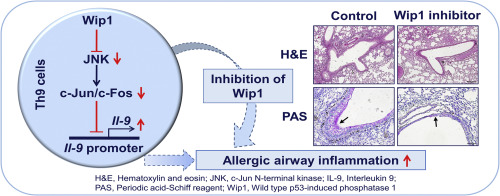Journal of Allergy and Clinical Immunology ( IF 11.4 ) Pub Date : 2017-07-19 , DOI: 10.1016/j.jaci.2017.06.026 Peng Wang , Huiting Su , Lianjun Zhang , Hui Chen , Xuelian Hu , Fan Yang , Jun Lv , Lianfeng Zhang , Yong Zhao

|
Background
Allergic asthma is one of the most common diseases worldwide, resulting in a burden of diseases. No available therapeutic regimens can cure asthma thus far.
Objective
We sought to identify new molecular targets for TH9 cell–mediated allergic airway inflammation.
Methods
Wild-type p53-induced phosphatase 1 (Wip1) gene knockout mice, Wip1 inhibitor–treated mice, and ovalbumin-induced allergic airway inflammation mouse models were used to characterize the roles of Wip1 in allergic airway inflammation. The induction of TH cell subsets in vitro, real-time PCR, immunoblots, luciferase assays, and chromatin immunoprecipitation assays were used to determine the regulatory pathways of Wip1 in TH9 differentiation.
Results
Here we demonstrate that Wip1-deficient mice are less prone to allergic airway inflammation, as indicated by the decreased pathologic alterations in lungs. Short-term treatment with a Wip1-specific inhibitor significantly ameliorates allergic inflammation progression. Intriguingly, Wip1 selectively impaired TH9 but not TH1, TH2, and TH17 cell differentiation. Biochemical assays show that Wip1 deficiency increases c-Jun/c-Fos activity in a c-Jun N-terminal kinase–dependent manner and that c-Jun/c-Fos directly binds to Il9 promoter and inhibits Il9 transcription.
Conclusion
Wip1 controls TH9 cell development through regulating c-Jun/c-Fos activity on the Il9 promoter and is important for the pathogenesis of allergic airway inflammation. These findings shed light on the previously unrecognized roles of Wip1 in TH9 cell differentiation. The inhibitory effects of a Wip1 inhibitor on the pathogenesis of allergic airway inflammation can have important implications for clinical application of Wip1 inhibitors in allergy therapies.
中文翻译:

磷酸酶野生型p53诱导的磷酸酶1控制T H 9细胞的发育和过敏性气道炎症
背景
过敏性哮喘是全世界最常见的疾病之一,导致疾病负担。迄今为止,尚无可用的治疗方案可以治愈哮喘。
客观的
我们试图确定T H 9细胞介导的过敏性气道炎症的新分子靶标。
方法
野生型p53诱导的磷酸酶1(Wip1)基因敲除小鼠,Wip1抑制剂治疗的小鼠和卵清蛋白诱导的过敏性气道炎症小鼠模型用于表征Wip1在过敏性气道炎症中的作用。体外诱导T H细胞亚群,实时PCR,免疫印迹,荧光素酶测定和染色质免疫沉淀测定被用于确定Wip1在T H 9分化中的调控途径。
结果
在这里,我们证明了Wip1缺陷型小鼠不易发生过敏性气道炎症,如肺部病理变化的减少所表明。Wip1特异性抑制剂的短期治疗可显着改善过敏性炎症的进展。有趣的是,选择性地WIP1受损Ť ħ 9,但不是T ħ 1,T ħ 2和T ħ 17细胞的分化。生化分析表明,Wip1缺乏症以c-Jun N端激酶依赖性方式增加c-Jun / c-Fos活性,而c-Jun / c-Fos直接与Il9启动子结合并抑制Il9转录。
结论
Wip1通过调节Il9启动子上的c-Jun / c-Fos活性来控制T H 9细胞的发育,对于变应性气道炎症的发病机理很重要。这些发现揭示了Wip1在T H 9细胞分化中先前未被认识的作用。Wip1抑制剂对过敏性气道炎症的发病机制的抑制作用可能对Wip1抑制剂在变态反应治疗中的临床应用具有重要意义。









































 京公网安备 11010802027423号
京公网安备 11010802027423号